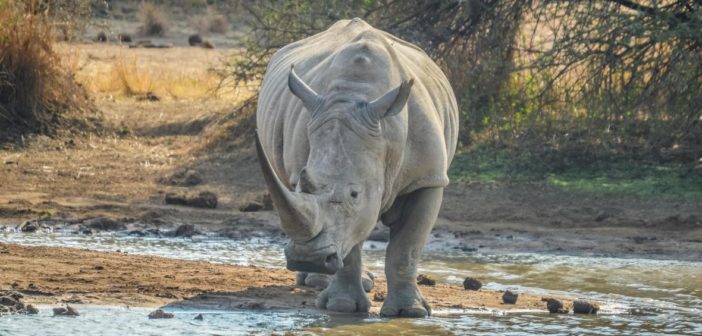South African National Parks (SANParks) and security partners in the Greater Kruger Region are jointly implementing a range of interventions as part of an integrated wildlife management approach to counter the effects of wildlife crime; in particular rhino poaching.
As part of several initiatives, certain entities have embarked on strategic dehorning of selected rhinos in the Greater Kruger Protected Area landscape; and these are ongoing.
Kruger National Park (KNP) has implemented a range of integrated management actions to minimise the impact of rhino poaching such as:
Strategic dehorning of rhino in certain core areas of the KNP.
Strengthening security measures by deploying more SANDF and SAPS patrols to conduct random stop and search operations within the KNP.
Specialised radar, airborne and other detection technologies to even track poachers on foot.
Highly trained tracker dogs and hounds to track suspected poachers in the bush.
Continue to brief the National Prosecuting Authority (NPA) on the state of wildlife crime.
It has been established that the loss of a cow has a compound effect since it also includes the loss of a dependant calf and future calves.
The compound effect is part of various factors that affect the population growth of rhinos apart from the immediate disruptive effect of poaching.
The cows are extremely important for the overall population performance and need to be protected by introducing stiffer sentences in incidents where they have been poached for their horn and a calf is left destitute.
The parties in the Greater Kruger landscape are committed to ensuring the survival of these species and will continuously communicate and innovate for the benefit of the ecosystem and protection of key species. SANParks, Provincial Parks in Limpopo (LEDET) and Mpumalanga (MTPA) as well as other private reserves within the Greater Kruger area have approved the initiative. The Greater Kruger parties will evaluate the effect of the integrated management response on an ongoing basis, and use the results and outcomes to adapt management approaches to the poaching scourge.
"These measures are not new in the fight against the scourge of poaching but we are intensifying them to render the incursions ineffective and counter the infiltration of our Rangers Corps by criminal syndicates.
The courts have imposed stiff sentences in recent trials which is welcome as it shows the seriousness of the crimes and the threat posed by the criminal syndicates to the fauna and flora of South Africa," said the Managing Executive of the KNP, Gareth Coleman.
SANParks appreciates the tourists that have reported suspicious characters which have led to successful arrests and continue to encourage communities and other members of society to assist with information so that we can get on top of this criminality. Since the beginning of July 2021, KNP has had 10 successful arrests with 7 high calibre firearms confiscated.
It is clear that risks are increasing for poachers that dare to venture into the KNP.
Issued by:
South African National Parks - Kruger National Park
Enquiries:
Isaac Phaahla
GM: Communications & Marketing - KNP
Tel: 013 735 4363, cell 083 673 6974 or email:
Isaac.phaahla@sanparks.orgPlease check Needs Attention pre-booking: https://africawild-forum.com/viewtopic.php?f=322&t=596



